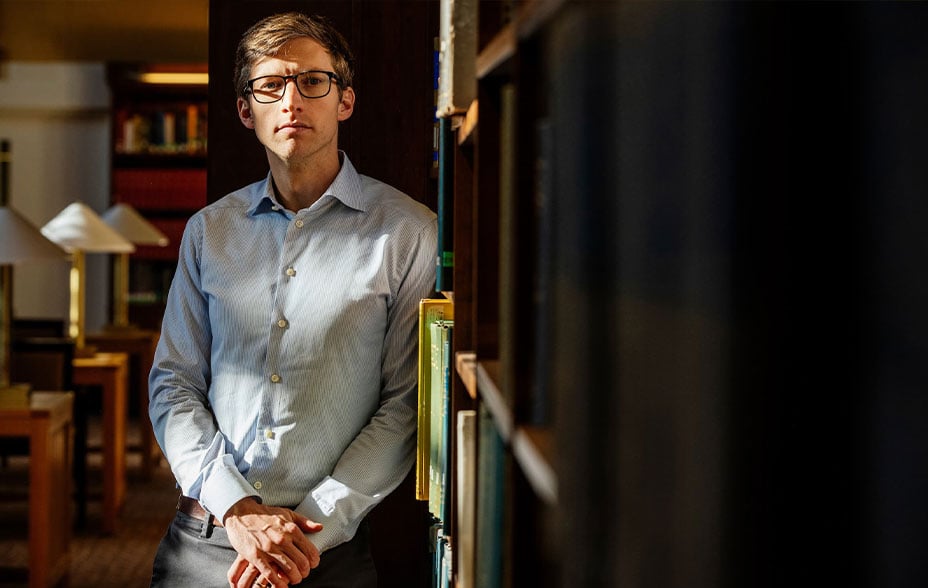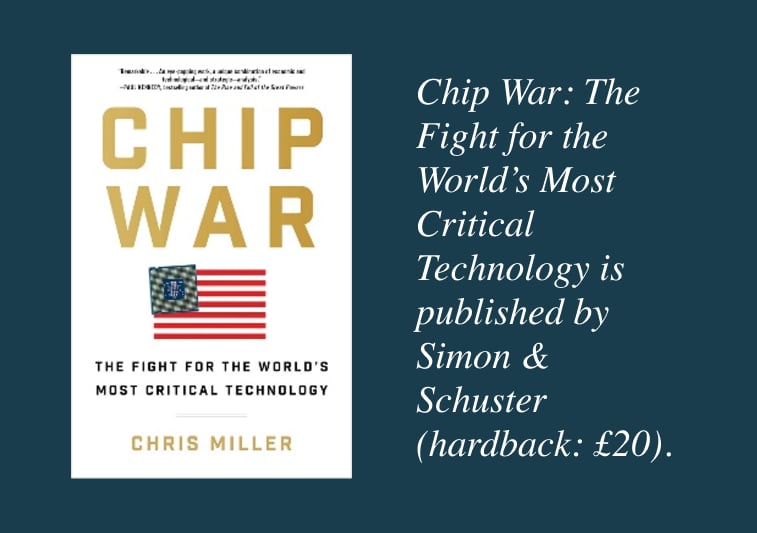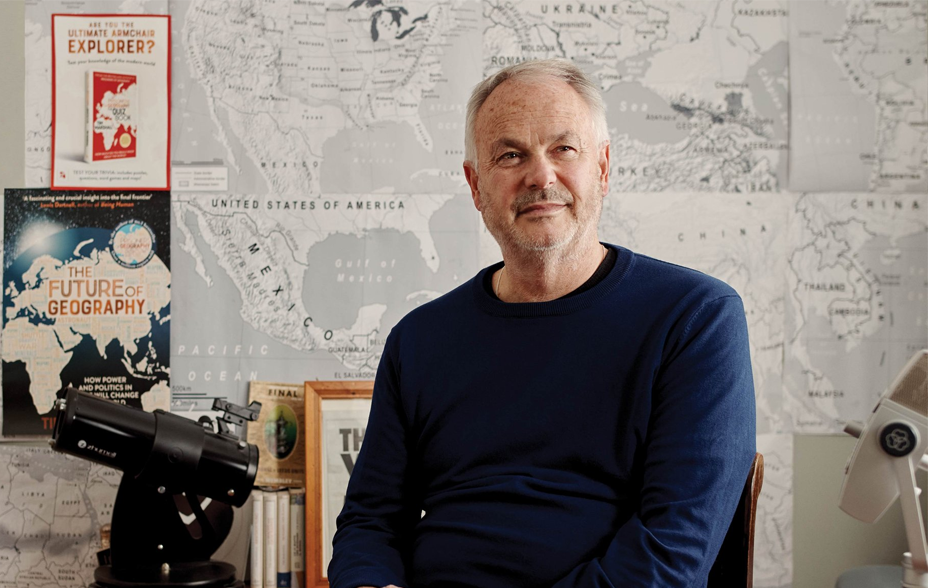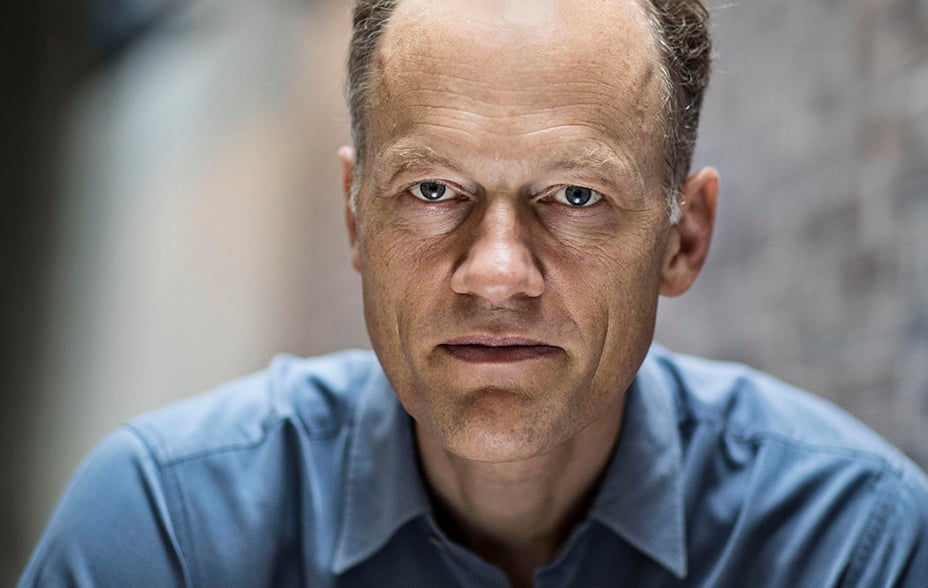
Author Chris Miller photographed by M. Scott Brauer
Please remember that the value of an investment can fall and you may not get back the amount invested.
At first glance, Chris Miller seems an unlikely guide to a technology that’s at the heart of commerce – and geopolitical power.
Before writing about semiconductors, the American academic specialised in the history of Russia and the former Soviet Union and was only vaguely familiar with the principles behind integrated circuits and transistors.
Yet his past expertise informs Chip War: The Fight for the World’s Most Critical Technology. What emerges is an essential guide to the future, involving an exploration of why the US gained the upper hand in the Cold War, the fault lines at the centre of current US-China tensions, as well as a lively story-packed account of what may be the 20th century’s greatest invention.
We first briefly meet at a London event to celebrate the book’s release before a trans-Atlantic conversation via Zoom. Miller tells me he started thinking about the book five years ago after wondering why the Soviet Union had struggled to produce guided missiles. As he began studying the computing technology of the 1950s and 1960s, he learned that the rocket engines involved were relatively straightforward. “The complicated part,” he explains, “is the guidance computer.”
He soon grasped that the genesis of today’s computer industry stems from missile guidance systems. The US military was the first major customer for silicon-based transistors and chips when it sought a miniaturised and more robust alternative to the vacuum tubes used in early computers.

Then another point caught his attention: today’s production of chips and the equipment that makes them are concentrated in a small number of companies and countries.
“I came to realise from those two data points - one historical, one in the present - the extent to which I didn't know much about chips,” he says. “They seemed to be important in a number of IT facets of the modern world.”
Growing demand
What convinced Miller to refocus his research was the discovery that China spends as much money importing chips as importing oil. “I had to download the data four times from the website to make sure I was looking at it correctly. It seemed so absurd,” he recalls. “I’m used to learning about oil as a strategic commodity, but not chips. It turns out that my entire vision of globalisation was deficient because it didn’t put semiconductors at the centre, where they belong.”
The history that emerged is a contrast in scales.
On the one hand, the 1s and 0s of binary code that form the basis of digital computing are conveyed in the physical world by microscopic on-off switches called transistors. Some of these are smaller than a coronavirus, and the most advanced chips pack billions into an area the size of a fingernail.
On the other hand, this story could scarcely be bigger. These chips are everywhere, providing the computing power for everything from video calls to cars, dishwashers to data centres.
The supply chains involved weave across the globe, involving some of the brightest minds and most innovative companies in science, engineering and manufacturing.
The chip industry in numbers
Semiconductor units shipped in 2021: 1.2 trillion
Transistors in Intel’s 4004 processor in 1971: 2,300
Transistors in Apple’s M1 Ultra processor in 2022: 114 billion
Global semiconductor sales in 2021: $556bn
Increase in sales of chips to China in 2021: 27 per cent
TSMC’s annual investment budget for 2022: $36bn (estimate)
Sources: Intel/Apple/TSMC/The Semiconductor Industry Association
Super-smooth mirrors
Consider ASML in the Netherlands. It’s the world’s only producer of the extreme ultraviolet lithography machines required to make the tiniest transistors possible today, enabling advances in computing power and energy efficiency. Apple and Samsung’s smartphones and laptops are among the products that benefit.
ASML’s massive machines require hundreds of thousands of components, some of which sound like they belong in science fiction. For example, mirrors that are so exact “they could be used to aim a laser to hit a golf ball as far away as the moon”. Costing about $150m per unit, the equipment is so complex that ASML provides its own extensively trained staff to help operate it, and they remain at the customers’ site for the duration of its lifespan.
“You can’t produce any tech at the advanced level today without ASML’s machines,” Miller adds. “None of the advanced chips we have would exist without them.”

ASML isn’t the only critical player. Miller explains how Taiwan Semiconductor Manufacturing Company (TSMC) came into being in 1987. It was the world’s first dedicated semiconductors foundry, meaning it only made chips for others at a time when other manufacturers focused on their own designs. The innovation made it possible for NVIDIA and Qualcomm, among others, to get their chips made without having to raise vast sums to build their own fabrication plants. Yet, at the same time as encouraging more entrants into the industry, it also caused things to become more centralised.
“Today, 90 per cent of the most advanced processor chips are made in Taiwan, and around a third of the additional computing power that the world produces annually comes from Taiwan,” Miller says. “Most smartphone processors come from Taiwan, a third or so of PC processors. Chips that run AI applications in data centres largely come from Taiwan. It would be very difficult to make telecoms infrastructure without chips produced in Taiwan.”
Complex supply chains
The island also has earthquakes, typhoons and a complex relationship with mainland China. President Biden has said that the US would defend Taiwan militarily if required.
But US government trade bans preventing Chinese companies from importing some of the chips manufactured by TSMC also play into tensions. Washington can impose its will because TSMC’s foundries rely on American software, equipment and intellectual properties.
“As I got deeper into the research and I realised the risk of the chip industry today, I did get more and more nervous and uncomfortable as I went on,” Miller says. “There’s a complicated interplay between our growing reliance on Taiwan, the increase of US-China geopolitical competition, the shift in semiconductor supply chains and the crucial role of chips produced in Taiwan to the future of the US and Chinese militaries. It all left me deeply worried that it could go horribly wrong... for the entire world.”
China, the US and the European Union are all trying to become more self-sufficient in chips to mitigate that risk. But Miller warns that this is an unrealistic goal for any country. It’s simply too expensive. “The reality is that the chip industry is defined by massive economies of scale at different parts of the supply chain. There’s a huge incentive to have concentration."

That’s one of the reasons, he points out, that the USSR failed to develop a competitive superconductor industry, despite the efforts of KGB spies and Soviet scientists to create its own. “It was locked out of many of the economies of scale that Western firms benefitted from,” Miller explains. And he suggests that failure may hold a clue to the sector’s future.
“The chip industry is not deglobalising,” Miller says. “The mutual interdependence of the US and the Netherlands and Japan and other countries is not going to reverse. It’s just that China is going to play a different role in the supply chain.”
Exactly what role it carves out for itself is likely to shape commerce, digital innovation and perhaps even the balance of power for years to come.

Risk Factors
The views expressed should not be considered as advice or a recommendation to buy, sell or hold a particular investment. They reflect opinion and should not be taken as statements of fact nor should any reliance be placed on them when making investment decisions.
This communication was produced and approved in December 2022 and has not been updated subsequently. It represents views held at the time of writing and may not reflect current thinking.
Potential for Profit and Loss
All investment strategies have the potential for profit and loss, your or your clients’ capital may be at risk. Past performance is not a guide to future returns.
This communication contains information on investments which does not constitute independent research. Accordingly, it is not subject to the protections afforded to independent research, but is classified as advertising under Art 68 of the Financial Services Act (‘FinSA’) and Baillie Gifford and its staff may have dealt in the investments concerned.
All information is sourced from Baillie Gifford & Co and is current unless otherwise stated.
The images used in this communication are for illustrative purposes only.
Important Information
Baillie Gifford & Co and Baillie Gifford & Co Limited are authorised and regulated by the Financial Conduct Authority (FCA). Baillie Gifford & Co Limited is an Authorised Corporate Director of OEICs.
Baillie Gifford Overseas Limited provides investment management and advisory services to non-UK Professional/Institutional clients only. Baillie Gifford Overseas Limited is wholly owned by Baillie Gifford & Co. Baillie Gifford & Co and Baillie Gifford Overseas Limited are authorised and regulated by the FCA in the UK.
Persons resident or domiciled outside the UK should consult with their professional advisers as to whether they require any governmental or other consents in order to enable them to invest, and with their tax advisers for advice relevant to their own particular circumstances.
Financial Intermediaries
This communication is suitable for use of financial intermediaries. Financial intermediaries are solely responsible for any further distribution and Baillie Gifford takes no responsibility for the reliance on this document by any other person who did not receive this document directly from Baillie Gifford.
Europe
Baillie Gifford Investment Management (Europe) Limited provides investment management and advisory services to European (excluding UK) clients. It was incorporated in Ireland in May 2018. Baillie Gifford Investment Management (Europe) Limited is authorised by the Central Bank of Ireland as an AIFM under the AIFM Regulations and as a UCITS management company under the UCITS Regulation. Baillie Gifford Investment Management (Europe) Limited is also authorised in accordance with Regulation 7 of the AIFM Regulations, to provide management of portfolios of investments, including Individual Portfolio Management (‘IPM’) and Non-Core Services. Baillie Gifford Investment Management (Europe) Limited has been appointed as UCITS management company to the following UCITS umbrella company; Baillie Gifford Worldwide Funds plc. Through passporting it has established Baillie Gifford Investment Management (Europe) Limited (Frankfurt Branch) to market its investment management and advisory services and distribute Baillie Gifford Worldwide Funds plc in Germany. Similarly, it has established Baillie Gifford Investment Management (Europe) Limited (Amsterdam Branch) to market its investment management and advisory services and distribute Baillie Gifford Worldwide Funds plc in The Netherlands. Baillie Gifford Investment Management (Europe) Limited also has a representative office in Zurich, Switzerland pursuant to Art. 58 of the Federal Act on Financial Institutions (“FinIA”). The representative office is authorised by the Swiss Financial Market Supervisory Authority (FINMA). The representative office does not constitute a branch and therefore does not have authority to commit Baillie Gifford Investment Management (Europe) Limited. Baillie Gifford Investment Management (Europe) Limited is a wholly owned subsidiary of Baillie Gifford Overseas Limited, which is wholly owned by Baillie Gifford & Co. Baillie Gifford Overseas Limited and Baillie Gifford & Co are authorised and regulated in the UK by the Financial Conduct Authority.
China
Baillie Gifford Investment Management (Shanghai) Limited 柏基投资管理(上海)有限公司(‘BGIMS’) is wholly owned by Baillie Gifford Overseas Limited and may provide investment research to the Baillie Gifford Group pursuant to applicable laws. BGIMS is incorporated in Shanghai in the People’s Republic of China (‘PRC’) as a wholly foreign-owned limited liability company with a unified social credit code of 91310000MA1FL6KQ30. BGIMS is a registered Private Fund Manager with the Asset Management Association of China (‘AMAC’) and manages private security investment fund in the PRC, with a registration code of P1071226.
Baillie Gifford Overseas Investment Fund Management (Shanghai) Limited柏基海外投资基金管理(上海)有限公司(‘BGQS’) is a wholly owned subsidiary of BGIMS incorporated in Shanghai as a limited liability company with its unified social credit code of 91310000MA1FL7JFXQ. BGQS is a registered Private Fund Manager with AMAC with a registration code of P1071708. BGQS has been approved by Shanghai Municipal Financial Regulatory Bureau for the Qualified Domestic Limited Partners (QDLP) Pilot Program, under which it may raise funds from PRC investors for making overseas investments.
Hong Kong
Baillie Gifford Asia (Hong Kong) Limited 柏基亞洲(香港)有限公司 is wholly owned by Baillie Gifford Overseas Limited and holds a Type 1 and a Type 2 license from the Securities & Futures Commission of Hong Kong to market and distribute Baillie Gifford’s range of collective investment schemes to professional investors in Hong Kong. Baillie Gifford Asia (Hong Kong) Limited 柏基亞洲(香港)有限公司 can be contacted at Suites 2713-2715, Two International Finance Centre, 8 Finance Street, Central, Hong Kong. Telephone +852 3756 5700.
South Korea
Baillie Gifford Overseas Limited is licensed with the Financial Services Commission in South Korea as a cross border Discretionary Investment Manager and Non-discretionary Investment Adviser.
Japan
Mitsubishi UFJ Baillie Gifford Asset Management Limited (‘MUBGAM’) is a joint venture company between Mitsubishi UFJ Trust & Banking Corporation and Baillie Gifford Overseas Limited. MUBGAM is authorised and regulated by the Financial Conduct Authority.
Australia
Baillie Gifford Overseas Limited (ARBN 118 567 178) is registered as a foreign company under the Corporations Act 2001 (Cth) and holds Foreign Australian Financial Services Licence No 528911. This material is provided to you on the basis that you are a “wholesale client” within the meaning of section 761G of the Corporations Act 2001 (Cth) (“Corporations Act”). Please advise Baillie Gifford Overseas Limited immediately if you are not a wholesale client. In no circumstances may this material be made available to a “retail client” within the meaning of section 761G of the Corporations Act.
This material contains general information only. It does not take into account any person’s objectives, financial situation or needs.
South Africa
Baillie Gifford Overseas Limited is registered as a Foreign Financial Services Provider with the Financial Sector Conduct Authority in South Africa.
North America
Baillie Gifford International LLC is wholly owned by Baillie Gifford Overseas Limited; it was formed in Delaware in 2005 and is registered with the SEC. It is the legal entity through which Baillie Gifford Overseas Limited provides client service and marketing functions in North America. Baillie Gifford Overseas Limited is registered with the SEC in the United States of America.
The Manager is not resident in Canada, its head office and principal place of business is in Edinburgh, Scotland. Baillie Gifford Overseas Limited is regulated in Canada as a portfolio manager and exempt market dealer with the Ontario Securities Commission ('OSC'). Its portfolio manager licence is currently passported into Alberta, Quebec, Saskatchewan, Manitoba and Newfoundland & Labrador whereas the exempt market dealer licence is passported across all Canadian provinces and territories. Baillie Gifford International LLC is regulated by the OSC as an exempt market and its licence is passported across all Canadian provinces and territories. Baillie Gifford Investment Management (Europe) Limited (‘BGE’) relies on the International Investment Fund Manager Exemption in the provinces of Ontario and Quebec.
Israel
Baillie Gifford Overseas is not licensed under Israel’s Regulation of Investment Advising, Investment Marketing and Portfolio Management Law, 5755-1995 (the Advice Law) and does not carry insurance pursuant to the Advice Law. This material is only intended for those categories of Israeli residents who are qualified clients listed on the First Addendum to the Advice Law.




